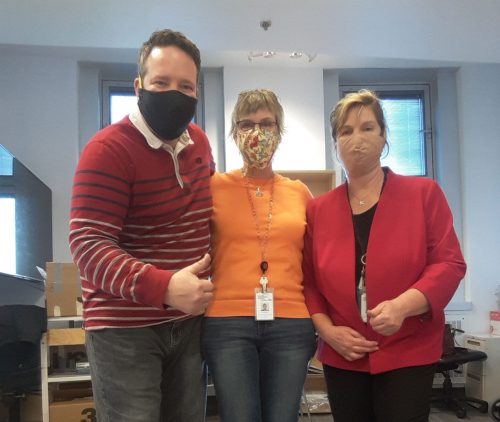
Hudson, QC Branch’s mask project. [Hudson Branch]
Royal Canadian Legion branches across the country have continued their good works in spite of and, in many cases, because of the challenges posed by the COVID-19 pandemic.
Branches were closed to social gatherings for months and, with buildings locked up and little money coming in, the financial blows to many have been devastating. Nevertheless, members stepped up with food runs, veterans’ outreach, efforts to help outfit front-line workers with protective equipment and other measures to help ease the situation in local communities.
“The Royal Canadian Legion has been around for 95 years—survived the Great Depression and war,” said Steven Dieter, Eastern Ontario public relations officer and a serving member of the Canadian Armed Forces, “but this is a unique situation.
“We are trying our best to be as resilient as possible. We have many creative people within our organization who are still working within our communities to help seniors, to help veterans.”
Branches have been unable to mark this year’s spate of landmark anniversaries or prepare for poster and literary competitions in the schools.
“So we volunteer elsewhere,” Dieter told Legion Magazine. “We use our resources where we can, contributing to our communities in these trying times without putting ourselves at risk.”
Here are some stories of branches that have gone above and beyond the call in extraordinary times:
In Port Moody, B.C., Legion volunteers handed out care packages to housebound veterans and seniors. In the small town of Brighton, Ont., local residents brought paper hearts in for the local branch to display to thank front-line workers. And in Kamsack, Sask., Branch President Jim Woodward and his wife Jean were contacting senior members in self-isolation.
“We make phone calls and go out and knock on doors to check and make sure all is well,” Woodward said. “From the beginning of the pandemic, we have been delivering food baskets to our senior members who have not been able to get out themselves. All the while we practise social distancing, and follow provincial and federal guidelines.”
“We tell people ‘If you need us, give us a call.’”
Eight members of Fonthill Branch near Niagara Falls, Ont., prepared and delivered more than 7,000 heat-and-serve meals free of charge to seniors, veterans, shut-ins and others for four months after the pandemic was declared.
Five staff worked in the kitchen preparing meatloaf, roast beef, chicken, sausage, cabbage rolls, pasta, perogies, sandwiches, salads, pies, cookies and more three days a week. Three others made the deliveries.
Meanwhile, the 278-member branch continued to raise funds by holding fish-fry drive-thrus on Friday nights, bagging and serving 500-600 meals a week right from the kitchen window.
The fish-fries and the complimentary dinners were so popular and the cooks so busy that the branch’s 50-year-old kitchen exhaust fan gave out in August and put a pause on the efforts just as COVID-19 restrictions were starting to ease.
Undaunted, two members organized an outdoor axe-throwing competition and raised enough funds to replace the old unit in early September. The branch, which did an Easter dinner in April, planned to keep on cooking as soon as the repair was done. The plan included a Thanksgiving dinner in mid-October.
“It’s been a great thing,” said Branch President Toni McKelvie, who’s been caring for her grandchildren and putting in hundreds of hours in the kitchen since the pandemic hit. “I’m so happy with the way it turned out.
“I expected maybe 150-200 meals; I didn’t think the shutdown would be that long. But the longer it got, people said ‘we’ll keep going.’ We have a good volunteer base here, which really helps a lot. I can’t wait to get started again.”
At North Calgary Branch, volunteers prepared more than 200 brown-bag meals a day, seven days a week, all summer long.
Initially targeting kids, the program soon expanded to include anyone in need, including seniors at a neighbouring residence.
Paying scrupulous attention to hygiene, sanitizing practices and social distancing, branch volunteers baked sandwich buns and local businesses donated ingredients along with fruit and fruit cups, yogurt, cookies and other goods.
“It’s for the communities around us where the schools were closed and the kids who would normally get their lunch there were not getting their lunches anymore,” said Branch President Mark Barham.
“We went to suppliers…and they climbed right into it and said ‘whatever you need.’”
At one point, a local company showed up with a truckload of fully loaded breakfast sandwiches—214 cases. The branch passed them on to a local food bank.
In one case, a Lebanese immigrant showed up with her child. Her husband was still in Lebanon and she had moved to Calgary from Montreal for work, but had lost her job due to the pandemic. The woman humbly asked for two lunches. But it was quickly ascertained that she had another child at home and had intended to split the two meals into three. She was given a third lunch and told to come back every day. She did.
Volunteers across the country are crafting face masks to help keep people safe. In Hudson, Que., branch member Don Staniforth and other volunteers joined forces with a local quilting group to provide Ste. Anne’s Hospital with 2,500 masks—enough to supply all patients and staff several times over.
“They did a great job,” said Branch President Rod Hodgson, who planned to initiate a graduated reopening of the local Legion hall in mid-September.
Hodson was sending out a weekly newsletter to branch members, meeting with comrades twice a week in the branch parking lot, and keeping in regular touch by phone with local veterans ranging in age from 85 to 95.
“That’s the main thing—keeping up to date with our members and letting them know what’s going on. We tell people, ‘If you need us, give us a call.’ Out of 420 members that we have, I received one phone call.”
Hodgson says it’s important to watch out for members, maintain contact with them, and keep them up to date with developments, especially in these uncertain times.
“You know, some of them are shut-ins, some of them don’t get out much. It’s important.”
“We’re viable for the next four or five years, at least. But you can’t stop. You stop, then forget about it.”
Col. Fred Tilston VC Branch in Aurora, Ont., got a special dispensation from the Ontario government to continue with monthly blood-donor clinics, mounted by the non-profit Canadian Blood Services throughout the pandemic.
Treasurer Claude Arcand, himself a long-time blood donor, joined other branch executives to monitor the clinics and ensure everything went smoothly and according to guidelines.
The branch began reopening on a graduated, reduced-hours basis in July. By September, it was open Wednesday to Sunday, serving Friday night barbecues on a newly expanded outdoor patio.
“We’ve been soliciting donations from our membership and they’ve been doing a very good job supporting us and helping us remain financially viable,” said Arcand.
The support enabled the branch to keep accounts current and donate to local charities. Branch resources and advocacy services remained available to members and veterans on a maximum 24-hours’ notice throughout the shutdown.
In Dalhousie, N.B., Branch, PresidentFloyd Vincent was spearheading efforts to maintain contact with members at a nearby seniors’ home along with others self-isolating at home. The branch provided face masks to those who needed them.
The branch Chase the Ace draw was helping, bringing in $400 to $500 a week. By September, the pot was at $5,500.
Community engagement and outreach is critical to the Legion, said Vincent, who’s 81 and showing no signs of stopping. The branch poppy chair, Marinus Degroot, is a 92-year-old Dutch veteran of the Second World War.
“You can’t slow down,” said Vincent, who was calling vets and chatting nightly throughout the shutdown. “You have to keep it going. We love the organization, we love the facility, and we’ve got a few dollars in the bank.
“We’re viable for the next four or five years, at least. But you can’t stop. You stop, then forget about it.”

In Brighton, Ont., residents brought paper hearts in for the local Legion branch to display to thank front-line workers for their courage and sacrifice during the Covid-19 pandemic. Branches across the country have stepped up in difficult times. [Brighton Branch]
In some places, the good works worked both ways.
Anne Marie Grenning, assistant manager of St. John’s Branch, was home painting her fence one day when her phone rang. Husband Greg is branch president and had forwarded Legion calls to their home.
On the other end of the line was Madonna Porter from nearby Conception Bay South.
Porter had seen a news story about the challenges facing the local Legion due to the pandemic and wanted to help by donating her entire collection of Barbie dolls and pottery to be auctioned as a fundraiser.
Stored in an outbuilding behind her home she calls “the museum” were more than 500 Barbies dating from the 1960s to present-day, displayed along the walls from floor to ceiling, covering a long table in the centre of the room, and in cabinets, boxes and plastic bins. An appraiser valued the doll collection alone at $250,000.
Porter worked in health care for 38 years, but struggled with depression, loneliness and PTSD after retiring. She told the St. John’s Telegram that collecting, sorting, cleaning and styling the Barbie dolls helped.
“It took care of my anxiety and stress,” she said. “Taking something that was a mess and fixing it up and making it beautiful again made me happy.”
She invited Grenning and three members of the branch executive over to see the results of her passion.
The branch was selling meals twice a week to help maintain accounts. Porter’s donation, Grenning said, is a godsend.
“The word for us is ‘astonishment,’” Grenning told the Telegram. “Pure joy.”
In Langford, B.C., Ultra Liquid Labs donated 350 bottles of hand sanitizer to the local Legion in mid-July.
“With everything going on in the world, donations [of hand sanitizer] to places like the Legion, who are so involved with the community, or to food banks is a necessity, because then it is reaching as many people as possible, and is also getting to people who may not have the means to buy things like hand sanitizer,” Chris Mathison, the company’s operations manager, told the Sooke News Mirror.
Branch manager Norm Scott said safety and security are paramount as social and community activities resume. The branch distributes more than $100,000 to local causes annually.
“When you come here…you feel safe,” said Scott.
Online meetings and events have been another way branches are keeping in touch. Woodbine Heights Branch in Toronto was hosting live music parties at what became its virtual branch. President Brenda Heath was inviting members and friends to host similar parties and play music, sing songs or tell stories.
“We’ll get through this together at a social distance,” said Heath.
Buddy Check Coffee, a program through which veterans meet and socialize in supportive settings, went online with Virtual Buddy Check Coffee, giving veterans a safe and convenient way of dropping in or hanging out and chatting.
The peer program is billed as an opportunity for comradeship in a relaxed environment, encouraging veterans to network and share experiences and stories, all while sipping coffee.
It is led by the Legion’s Operational Stress Injury Special Section (Legion OSI) and hosted by Legion members. More information is available on the RCL website and the Buddy Check Coffee Facebook page.
“We’ll get through this together at a social distance.”
In Penetanguishene, Ont., Legion volunteers were delivering supplies across a wide swath of Simcoe County off the southeastern tip of Georgian Bay.
“It all began as an idea that we would deliver groceries and prescriptions to veterans,” said Branch President Paul Howe. “Then somehow we ended up doing it for veterans, seniors and shut-ins. There was no problem with that.”
As many as eight masked volunteers did grocery shopping while another eight drivers delivered the goods. Some recipients would phone or e-mail their orders directly to the grocery store, paying for them remotely.
“We ended up doing almost 450 deliveries” all over the township, some as far as 35 kilometres away, said Howe, a veteran himself. “We were all over the place. The seniors really appreciated it.”
The local Foodland grocer donated $1,000 to the cause along with $25 gift certificates to the volunteers who, without exception, turned them over to those in the community who truly needed them.
Howe also asked the ladies auxiliary to organize a phone team to call members every couple of weeks to ensure they were safe and supplied.
“You don’t appreciate what you’ve got until you don’t have it,” said Howe.
Lockerby Branch in Sudbury, Ont., has offered two free meals a week to veterans and seniors at risk since the pandemic began.
“Originally we just started by word of mouth and putting it out to our membership,” said President Mary Michasiw. “The next step was putting it out to the city and they sent out our information to numerous organizations.”
Soon the referrals were coming in.
“Everybody wants to help and everyone wants everyone to be safe.”
It wasn’t long before the branch had 50 people signed up for the meals, with more reaching out to help.
“It’s not about how much money they have,” said Michasiw. “It’s about accessing services and pride and asking for help and that kind of thing.”
Michasiw said she hoped to continue the program after the pandemic ends.
“We have wonderful volunteers who are prepared to either work in the kitchen or deliver the meals. I would like to see the program continue in some capacity.”
The efforts went to the core of what the Legion is all about. With its social elements in limbo, members gravitated toward good works.
“Legion members are united right across the country,” declared Dominion President Tom Irvine in The Globe and Mail. “They’re doing what is best for the veterans in their communities because they care. They’re extremely supportive.”
Advertisement

















